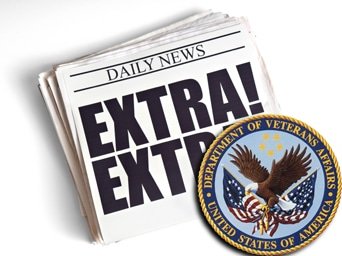By Terri Moon Cronk
American Forces Press Service
WASHINGTON, May 30, 2012 – The U.S. Department of Veterans Affairs wants veterans to know about their benefits, from job and education opportunities to home loans and programs for those who are disabled, a VA official said yesterday.
Veterans caught in today’s high rate of unemployment likely can find a job in one of the more than 200 high-demand careers that have been identified by the Department of Labor, said Curtis Coy, VA’s deputy under secretary for economic opportunity. Those occupations are listed on the VA’s Web site.
The U.S. Department of Labor’s most-recent figures from last year show 900,000 veterans out of work, averaging 7.7 percent of Americans, and 12.1 percent for veterans returning home from Iraq and Afghanistan. “The high-demand jobs list is not a narrow one; in fact, it is a very broad list,” Coy said, adding that the 2011 legislation, VOW to Hire Heroes Act of 2011 was enacted for veterans looking for “meaningful employment in high-demand jobs.”
Overall, the VOW to Hire Heroes Act would lower the rate of unemployment among the nation’s veterans, and combine two Congressional provisions from the Veterans Opportunity to Work Act and the Hiring Heroes Act, VA officials said. The act also would provide veterans tax credits in an all-inclusive jobs package to fight the veteran unemployment rate. The act has more than 20 provisions, including tax credits for businesses that hire veterans, Coy said.
It also makes the Transition Assistance Program mandatory as of Nov. 21 for every departing service member. TAP readies departing active-duty personnel to re-enter the civilian world, officials said. “[TAP] is going to have a major impact on VA, DOL and the Defense Department because what used to be a voluntary program is now mandatory,” Coy said.
Coy also wants veterans to know they can apply for up to a year of paid training to qualify for high-demand jobs through the Veterans Retraining Assistance Program. The VRAP training is geared toward veterans between the ages of 35 and 60, the hardest-hit unemployed age group, he said, adding that the education benefit must, by law be used toward earning an associate’s degree or job certification. “The marketing tool we use is if you are or know of a veteran between ages 35 and 60 who’s unemployed and [can] use another year of educational benefits to attain a high-demand job, the VRAP program is the exact, wonderful new benefit that will help them get that meaningful employment,” Coy said.
Applicants for the education program are taken on a first-come, first-served basis after their eligibility is confirmed, he added. The VA Web site has details. “I think the VA always has been the institution that takes a look at our veterans, not only today, but veterans of the past, and provides those services and benefits that Congress has so generously provided to [them],” said Coy, a 24-year Navy veteran. “Our job is to ensure veterans know of and get the benefits they so richly deserve.”
In addition to benefits for training for jobs, Coy wants veterans and active-duty service members to know about VA’s Home Loan Guaranty program for VA mortgages and Specially Adapted Housing Grants.VA mortgages in the past 15 quarters had the lowest foreclosure rates of any component in the country, Coy said.
“That speaks volumes about our veterans, their responsibilities, and how they deal with business,” he said. “The foreclosure rate in this country and the number of homes under water is a problem for many Americans. What we’ve done to help our veterans is keep a very close eye on [their] mortgages.” VA doesn’t lend veterans the money for mortgages. Instead, VA provides a loan guarantee. “We have a vested interest in being good stewards of our taxpayer money,” Coy said. “Last year, we helped over 72,000 vets retain their homes who may not have been able to retain them otherwise. That’s a 10-percent increase over the year before.”
He said the VA provides proactive support for veterans who might get into trouble with their mortgage. “We can be good agents for them, and in some cases intercede or help them with their banks and mortgage lenders to perhaps restructure [the loan] or take a look at the nuances of that particular mortgage,” Coy explained. “We want to make sure our veterans stay in their homes, and we do everything to help them do just that,” he added.
Eligibility for a VA home loan includes being a veteran or service member, having good credit and the ability to pay the mortgage, Coy said, noting no money down is required, unlike private lenders. “We are very scrupulous to make sure veterans don’t get in over their heads on their mortgages,” he said.
The VA also offers Specially Adapted Housing Grants for disabled veterans and wounded warriors, with grants up to $64,000 in homeowner assistance used to configure veterans’ homes for their particular disability, Coy said.
Information on the grant is available on the VA Web site, along with toll-free numbers, a list of 57 regional offices across the country, and some 800 vocation and rehabilitation programs. “The VA always has been the institution that takes a look at our veterans, not only [from] today, but veterans of the past, and provides those services and benefits that Congress has so generously provided,” Coy said. “Our job is to ensure veterans know of and get the benefits they so richly deserve.”
Source: @ www.defense.gov
ATTENTION READERS
We See The World From All Sides and Want YOU To Be Fully InformedIn fact, intentional disinformation is a disgraceful scourge in media today. So to assuage any possible errant incorrect information posted herein, we strongly encourage you to seek corroboration from other non-VT sources before forming an educated opinion.
About VT - Policies & Disclosures - Comment Policy




